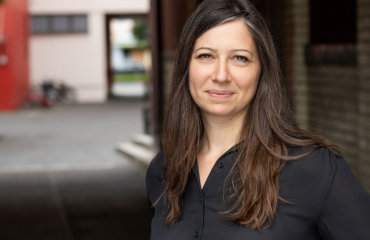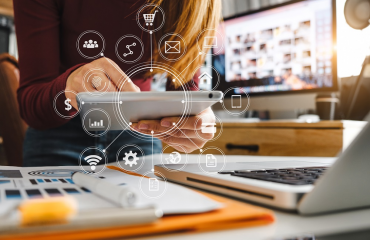Upper Echelon Founder Travis Killian On The Ever-Changing Retail Game – Forbes
Reinventing the wheel. This idea has become emblematic of efforts to improve on functional perfection. However, the most practical things benefit from user-driven improvement over time. The first mobile phone presented in 1973 weighed 4.4 lbs. or nearly 2 kg. Its battery lasted 20 minutes. Now, at an average of 5.5 ounces and a battery life that can last for a few days, it’s hard to believe where the handheld device started. The beverage industry’s continued evolution of the bottle and can designs is a classic case study in proactive design solutions. Too often, the names and stories of people behind these innovations escape public attention.
Travis Killian is one such “unsung hero” of entrepreneurship in the e-commerce era. While you may not be familiar with him (yet), you are likely among the millions of people enjoying home and wellness goods from Upper Echelon Products, a company he founded in 2015. Its origin story is an umbrella. The United States is one of the largest importers of umbrellas, and it was only a matter of time before someone gave the product that-American-made-quality-upgrade. Killian’s Texas-based startup offered a bold lifetime replacement warranty on its Repel model. Key structural tweaks were “a two percent improvement” and yet, they allowed the brand to storm Amazon rankings and captivate mass media in ways last reserved for that Rihanna song.
Travis Killian – the CEO and an owner of Everlasting Comfort
The notion of simplicity through efficiency integrates ubiquitous products with intentionality rooted in wellness principles. This business concept proved extremely lucrative. The Everlasting Comfort range now includes memory foam seat cushion and footrest pillow, ultrasonic humidifier, and the softest blankets you’ll ever touch. All are certified bestsellers in their respective niches. Claim enough niches, and you win the segment. The mindful development strategy made Killian one of the most successful marketers in Amazon’s history. Business is only heating up now that a home is also a home office and staycation is the new getaway. A worthwhile sidenote: the Information Technology and Innovation Foundation historical survey found that the median age for inventors of market disrupting products and services is 47 years old. Killian belongs to an elite 6% of outliers who achieve that status by the time they turn 30. I reached out to the home-and-wellness mogul to talk about what it takes to redefine an entire retail category, the challenges of reinventing the wheel, the benefits of wearing your best clothes while working remotely. Meet the man on a singular mission to make you more comfortable.
What made you decide to “tackle” an umbrella first?
At the time, the best marketers were going into beauty, fashion, or supplement brands. We were looking for a product that was not extremely competitive, had steady demand and we felt we could really do well to improve upon. Umbrellas made it to the top of our list and no one else seemed really interested in them. Umbrellas were selling before I was born and will continue to sell for many years, which made the idea of a legacy company particularly appealing. We spent months combing through the dissatisfied customer reviews on e-commerce sites taking note of most common complaints and wishes. Then we went to work to give people the umbrella they wanted.
Your products aim to elevate everyday comfort. What does comfort mean to you?
Comfort and authenticity are one and the same to me. I am always diving into the world of health and wellness to educate myself first. I advocate for products I believe in and personally use. If you stay aligned with your priorities, it’s possible to achieve a healthy and balanced lifestyle. It is something I pride myself on. Our company’s approach to wellness stands out from our competitors in that we steadfastly believe in doing well by doing good. Our success depends on the good we’re doing in the world. We don’t attack our competitors. We solely keep the focus on ourselves and motivate our team to be the best we can be to constantly exceed consumer expectations.
How has COVID affected the comfort industry and your business?
With more people spending longer time at home, quality comfort and wellness products have become necessities imperative for maintaining better mood and optimal energy levels to take on the day. Every product is meant to function to improve the user’s life. Throughout COVID, we focused on expanding our logistics department and hiring people well equipped to keep up with the pace of changes. The bullwhip effect rippled through the entire supply chain. We still are not through this supply chain mess. Container costs dipped briefly, but now are heading towards all-time highs. Inflation and labor shortages are among the biggest issues that direct-to-consumer makers of physical products face in 2022. We are expanding our reach throughout Canada and the European Union now and becoming uniquely aware of how these customers are both different from and similar to our US demographic. At the end of the day, our customers are our priorities.
Given the power of the algorithms is the human factor lost in today’s marketing?
The Human Factor is far from lost! In fact, the more Human you are with your marketing, the more you will stand out. Algorithms are designed to emulate what humans would do. Search engines are designed to deliver top results that a group of humans would likely agree on. I always think about how to optimize what a person would want to see, then think about ways that an algorithm could automatically determine if a listing or an ad would be engaging. There is nothing artificial about the collective intelligence of you and your audience. The social proof is in our reviews.
What is a piece of advice that has proved the most valuable in your different ventures?
First, be adaptable. What we do now is different from what we were doing 5 years ago or would do 5 years from now. I am constantly studying competitors. Even in categories we don’t sell in! It is important just to identify those people who are doing something unique. An outlier often turns out to be a trendsetter. Be eager to learn and test wildly different strategies. Second, become your own picky customer. Listening to feedback, responding with timely changes, being proactive about innovation. I think that’s what keeps any business on top.
What have you learned from your biggest challenges in entrepreneurship?
When you run an innovative company, facing challenges is modus operandi. At first, I had to learn to effectively delegate, to trust my team, and hire people who are truly aligned with the company values. I also had to learn how to inspire, have my team’s back, stand up for them, lead. I had to learn how to be a unifier, how to think ever bigger, adapt to macro conditions in the market. Every “challenge” is a chance to do better and become better.
How do you handle the pressure to innovate and grow?
It’s not pressure, it’s desire to innovate. I slow down and reflect, take time to pinpoint the issue and the opportunity therein. Then strategize our next moves. I look for new ways to appreciate the work my team does, discover different paths forward to benefit our consumers better and get to know myself in more meaningful ways.
With several best-selling products behind you, what is the ratio of business savvy, technical knowhow and alchemy/magic/luck in delivering a retail hit?
If I were to guess, I’d say it’s probably 50% business savvy, 30% technical knowhow and 20% luck. Luck plays a part in any major success story, but business savvy and technical knowhow make you more likely to attract luck. It’s all about tilting the odds of being lucky in your favor. I believe luck is inevitable if you take the right actions and you can take the right actions if you model after people that have been successful in whatever niche you want to go into.
How would you describe your sense of style?
Even though we are working remotely, I really think the way we dress affects our productivity. Part of my routine even working from home is putting myself together every morning, so I look and feel the part. It’s super important to emulate everything you want to be.
What is the most pressing question on your entrepreneurial mind now?
What are we really capable of? Both myself and our company. We keep setting high goals and hitting them. So, are we setting the goals not high enough or are we more capable than we think? I believe it is a good question to investigate for any entrepreneur right now.



